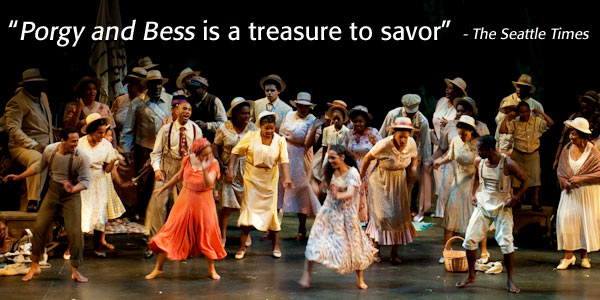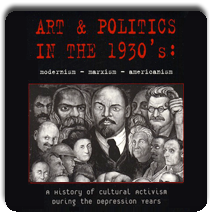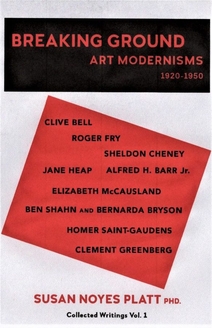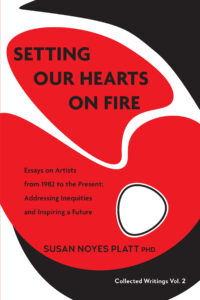Porgy and Bess and The Help
The Gershwin Porgy and Bess, all too briefly playing at the Seattle Opera, is stupendous. I read a lot about the history of the opera, the debates about whether it was a musical or an opera, the complaints about the stereotyping of blacks, the protests by blacks during the Civil Rights era that Gershwin’s language as well as the use of “Negro spirituals” and other popular music forms was disrespectful and poorly understanding the spirit of the original.
Forget it all! It is a magnificent story, opera, and staging. The stage is obviously influenced by 19th century American genre artists like Eastman Johnson and Winslow Homer who depicted black life in America ( there are books full of this type of imagery). The setting is a small black enclave on the sea set in the early 20th century. The Gershwin estate requires that the entire cast be African American, the only whites are the policemen, as is appropriate. So one of the reasons the opera isn’t performed more frequently is that if an Opera company has a resident group of singers they are usually mostly white.
So I purposely didn’t read the story before hand and just in case there are other people who don’t know it I won’t give it away. But one shocker is that a New York production is changing the ending to a “Happy” ending for Broadway audiences . The ending, I think, is already happy, it is about love, about hope, about a lot of real life ambiguities, between home and life. The characters, who are accused by the NY production of being one dimensional are far from that, they are layered, contradictory, and full of dignity and passion. Human nature is on full display here also in a community of people that both stand together and display petty prejudice ( against a cripple or a prostitute, or having a good time, for example), who are cowardly and loving, protective and bold. The community has vendors passing through who sell fresh crabs, strawberries and honey on the comb. ( A recent article pointed out that poor people can no longer afford pricey organic food- well poor people produced organic food until recent changes in agriculture).
Also, there are many star singers, in addition to the leads, all of the arias were magnificently done, the choreography was stunning. In “It Ain’t Necessarily so” a piece that might have been choreographed as an almost minstrel piece, the dancing was brilliantly subtle.
All of the singers were passionate and profound in their emotional range, their demeanor and their enactment of the story.
But above all, I loved the Gershwin score: it contained the characters, the drama, the love, the hope, in the music itself. It was transcendent.
I can’t imagine what the NY production will do for music for a different ending since the music is absolutely matched to the story now.
At the same time the movie The Help has just been released. I read the book this summer and thought it was arrogant but intriguing- a white woman taking the voices of black maids, and their stories as the basis of a novel she is writing. It is set in Jackson, Mississippi during the Civil Rights Era. In the movie it is one of the black maids who is the voice over throughout, she becomes the star, shifting the tone. The black actresses do a brilliant job, you can sense they are way more than the sum of the parts of this rather shallow effort of a novel.
The underlying premise of the Help is a white woman recording the stories of black maids in Mississippi in the 1960s. It is an absurd premise. No black maid would have talked openly to a white women at that time.Or even today for that matter. The result is that the stories are sugar coated, the events seem idealized, particularly the ending when Abiline (Viola Davis) loses her job and walks slowly down the street with the plan of becoming a writer. As one friend of mine said, what about the reality of losing a job, of having no money. It is a white woman’s fantasy that walks down that street.
The two stars Viola Davis and Octavia Spencer celebrating the publication of the book The Help to which they contributed anonymously.
I think the author should donate her proceeds to the Southern Poverty Law Center.
Comparing to Porgy and Bess, also a story written by a white writer in the South, it comes off a distant second in terms of empathy. While no white person can possibly be able to understand an African American experience and the ongoing racism in our society, at least in Porgy and Bess, there is a sense of believable humanity. The black maids, as projections from a white mind, are definately much less insightfully drawn. If there were an opera of this story, it would be quite limited in scope. I have been trying to find out if the author ever actually talked to any African Americans maid or otherwise about their experiences. Here is one good review.
In spite of all this Viola Davis and Octavia Spencer are brilliant and compelling. They add a depth that was absent from the novel.
October 19: I am amending this entry because I just read Anne Moody’s Coming of Age in Mississippi. It was published in 1968. It is an astonishing autobiography of the realities of being black in Mississippi in this same time frame. The murder of Medgar Evers in the midst of the civil rights activism of the early 1960s is in both the Help and Moody’s book. In Moody’s account, there were several marches, confrontations with police, people put in jail by the hundreds. Her book is indispensable reading for anyone who wants to understand the incredible courage of the people who participated in the early sixties Civil Rights actions in Mississippi. She herself was part of the historic Woolworth Sit In, and an active organizer with NAACP and CORE. Her book should definately be the movie that is made!
This entry was posted on August 16, 2011 and is filed under Anne Moody, Porgy and Bess, White writers on black experience.










